新概念英语第二册Lesson18
新概念英语第二册Lesson18heoftendoesthis课件

Words and phrases
5. pay the bill 付账
6. take 把…带走 bring 把…带来 fetch 去取某物(一来一去的动作)
Words and phrases
7. return v. ①come back 回来
eg: He has just returned from Australia. ②give back 归还 eg: He returned the book to the library. n. 回来,归还 in return for … 作为…的回报
Exercise
一、选词填空
beside besides except look for find look forward to
1.When the bus stopped, an old man beside me got off.
2.No one can contact the manager except
miss you.
6.I’m looking for
my glasses. I can’t find them
anywhere.
Exercise
二、单项选择
1.In order to keep fit, I B a walk after dinner everyday.
A. get
B. take
C. make D. try
A. away
B. in
C. up
D. down
Fill in the blanks 1
He often does this! After I had had lunch at a village__p_ub__, I looked for my bag. I had left it on a chair beside the door and now it wasn't there! As I was looking for it, the __la_n_d_lo_r_d__came in.”Did you have a good meal?" he asked. 'Yes, thank you,' I answered, 'but I can't pay the__b_il_l __. I haven't got my bag.'The landlord smiled and immediately went out. In a few minutes he returned with my bag and gave it back to me.'I'm very sorry,' he said. 'My dog had taken it into the garden. He often does this!'
新概念英语第二册课件Lesson18
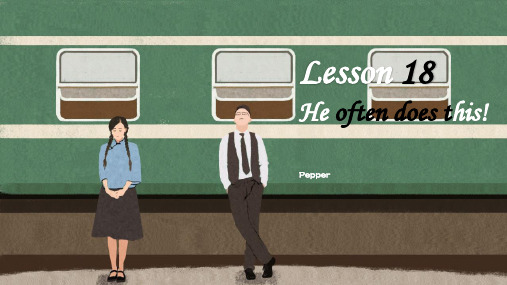
在同一范围内
Guilin is in the north of Guangxi.
to
不在同一范围内,也不接壤 Japan is to the east of China.
next to 紧靠…的旁边
The shop is next to the school.
beside 在…旁边
Come and sit beside (/by) me.
表示延续时间的介词
介词
用法
by
意为“在……之前;不迟于……”
for
意为“在……之前;不迟于……”
in
意为“在……以后;在……时间内”
since
意为“自从……以来;自……以后”
until
用于否定句中,意为“直到……才”,其前的谓语动词多为非延续性动词
用在肯定句中,意为“直到……为止”,其前谓语动词须用延续性动词
by
在…旁边,与 beside 可以互换 There is a chair by(beside) the table.
near 在…附近
There is a theatre near his home.
表示方位的介词
介词
用法
例句
around over
above
under
在…周围 在…(垂直)的正上方 抽象概念职位高低 在…(不一定垂直)的上方 职位高低 在…(垂直的)正下方
have用于“情态动词+have+过去分词”的结构,有推测、假设之意。 1.must+have+过去分词,表示对过去时间发生的动作或存在的情况 的推测,一般用于肯定句。
You must have left your bag in the theatre.
新概念英语第二册课件Lesson18共15页PPT

子男)
3.bill /bil/ n. 帐单
• 1.议案;法案 • 2.纸币;钞票 • 3.广告;海报 常用搭配: foot the bill 付账;负责 pay/settle the bill 付账 fill the bill 适合
text
• 1、After I had had lunch at a village pub, I looked for my bag.
• Pub是public house(酒店,酒店) 的缩写
• Let’s go to the pub for a drink.
• 2、I had left it on a chair beside the door and now it wasn't there!
• leave除了“离去,离开,出发” 的意思,还可以表示“把(人、 物)留下,遗留,丢下”等。
还有许多其他事要做。 • beside pron. 在……旁边,在……附近 • besides adv. 而且,并且,此外;pron. 除……
之外(还)
• I’m quite busy today. Besides, I’ve got a bad cold.
• There were a lot of people at the party besides us.
Have的用法
• 1、have作为助动词构成各种完成时和完成 进行时
• 2、have还可以作完全动词,当作“具有、 拥有”讲时,它和have got通常可以互换。 have做 “有, 患病” 概念时, 可作为实义动 词, 也可作为非实义动词。在英国英语中的 疑问句和否定句中have(具有)的用法与 be相同,即可以不用助动词do或did;在美 国英语中,常用do助动词和have一起构成 疑问句和否定句。
新概念英语第二册课文翻译:Lesson 18 He often does this
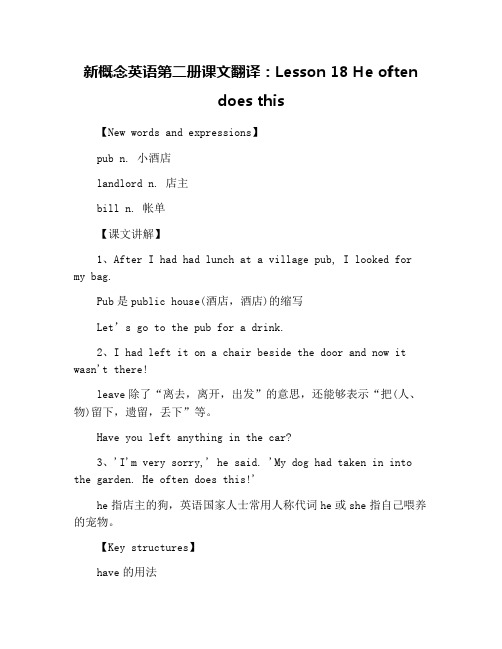
新概念英语第二册课文翻译:Lesson 18 He oftendoes this【New words and expressions】pub n. 小酒店landlord n. 店主bill n. 帐单【课文讲解】1、After I had had lunch at a village pub, I looked for my bag.Pub是public house(酒店,酒店)的缩写Let’s go to the pub for a drink.2、I had left it on a chair beside the door and now it wasn't there!leave除了“离去,离开,出发”的意思,还能够表示“把(人、物)留下,遗留,丢下”等。
Have you left anything in the car?3、'I'm very sorry,' he said. 'My dog had taken in into the garden. He often does this!'he指店主的狗,英语国家人士常用人称代词he或she指自己喂养的宠物。
【Key structures】have的用法1、have作为助动词构成各种完成时和完成实行时2、have还能够作完全动词,当作“具有、拥有”讲时,它和have got通常能够互换。
have做“有, 患病” 概念时, 可作为实义动词, 也可作为非实义动词。
在英国英语中的疑问句和否定句中have(具有)的用法与be相同,即能够不用助动词do或did;在美国英语中,常用do助动词和have一起构成疑问句和否定句。
I don’t h ave a pen/a headache.I haven’t a pen /a headache.三种情况have 能够用 have got取代I have a pen. I have got a pen. “有”I have a headache. I have got a headache. “得病”have to== have got tohave作“具有,拥有”讲时是状态动词,不能用于实行时态或被动语态,通常用于一般现在时。
新概念英语2第18课

pig, ham新概s念t英e语r,2第1c8课ow
Among these animals , which of them can be kept as pets?
新概念英语2第18课
Debate Do you like having pets?
新概念英语2第18课
Today we’ll listen to a story about a woman who couldn’t find her handbag.
True or false?
1.The writer had lunch at a village pub. 2.She couldn’t find her bag after her meal . 3.She could pay the bill . 4.The landlord soon found it for her. 5.The dog had taken it into the park.
1.dirty 2.waste time and money 3.carry some disease
新概念英语2第18课
Did you raise any pets? Do you like dogs as your pet?
新概念英语2第18课
When we talk about a dog, what words will you think of?
新概念英语2第18课
listen to the tape again and answer the question: What happened to the writer’s bag?
新概念英语第二册第18课
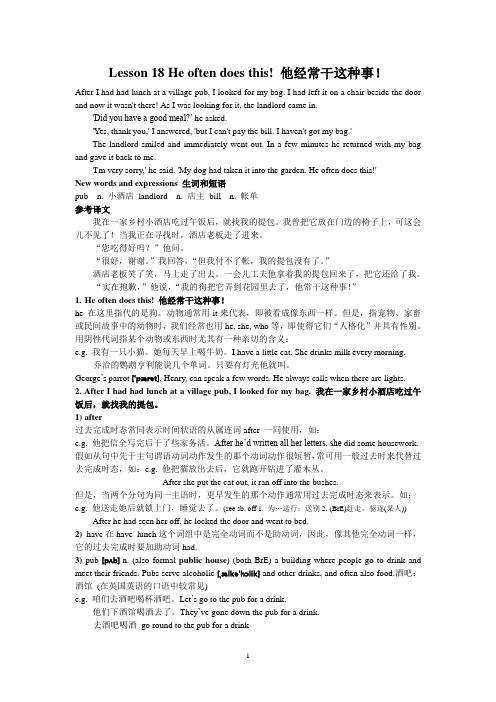
Lesson 18 He often does this! 他经常干这种事!After I had had lunch at a village pub, I looked for my bag. I had left it on a chair beside the door and now it wasn't there! As I was looking for it, the landlord came in.'Did you have a good meal?’ he asked.'Yes, thank you,' I answered, 'but I can't pay the bill. I haven't got my bag.'The landlord smiled and immediately went out. In a few minutes he returned with my bag and gave it back to me.'I'm very sorry,' he said. 'My dog had taken it into the garden. He often does this!'New words and expressions 生词和短语pub n. 小酒店landlord n. 店主bill n. 帐单参考译文我在一家乡村小酒店吃过午饭后,就找我的提包。
我曾把它放在门边的椅子上,可这会儿不见了!当我正在寻找时,酒店老板走了进来。
“您吃得好吗?”他问。
“很好,谢谢。
”我回答,“但我付不了帐,我的提包没有了。
”酒店老板笑了笑,马上走了出去。
一会儿工夫他拿着我的提包回来了,把它还给了我。
“实在抱歉,”他说,“我的狗把它弄到花园里去了,他常干这种事!”1.He often does this! 他经常干这种事!he 在这里指代的是狗。
新概念英语第二册第18课
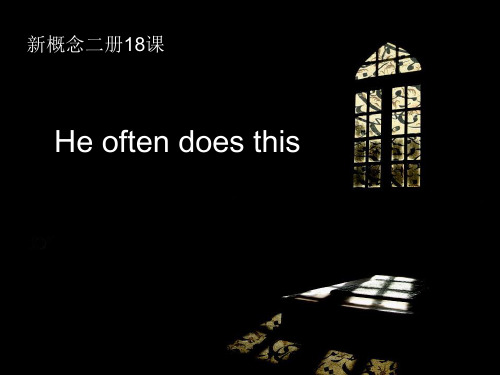
用带give的词组填空
Will the person who took my ruler please back give it ______ to me. 请那个拿了我尺子的人把尺子还给我。 When my children grew up ,I give all their away . toys _______ 当孩子长大成人,我就把他们的玩具给别的小孩玩。 We were losing the battle but we did not up give ________ . 我们已经输了战争,但是我们不会放弃。
(4) at a village pub
I like village pubs.
(5) look for(寻找)
我正在找我的铅笔。 I am looking for my pencil.
Wonderful sentences
2.I had left it on a chair beside the door and now it wasn’t there. 精彩点: (1)had left (2)leave something on …(把…遗忘在…)
Wonderful sentences
1.After I had had lunch at a village pub, I looked for my bag. 语言精彩点: (1)过去完成时的完美运用 (2)I had had lunch.
造句: 我那时已经吃过早餐/晚餐。 I had had breakfast/supper.
新概念英语第二册课后练习题答案详解(第18课)
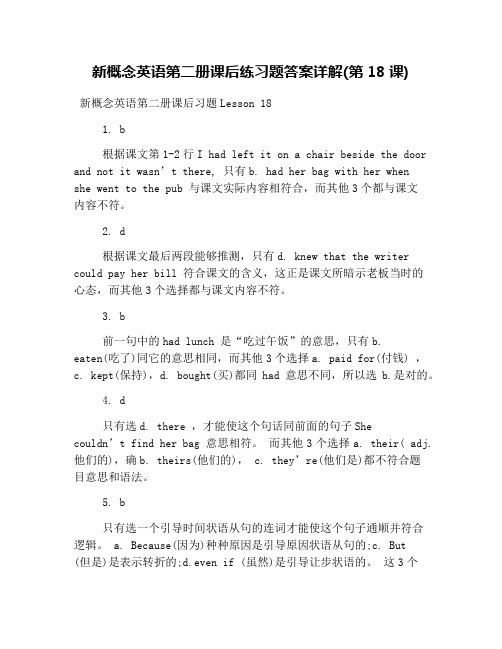
新概念英语第二册课后练习题答案详解(第18课)新概念英语第二册课后习题Lesson 181. b根据课文第1-2行I had left it on a chair beside the door and not it wasn’t there, 只有b. had her bag with her whenshe went to the pub 与课文实际内容相符合,而其他3个都与课文内容不符。
2. d根据课文最后两段能够推测,只有d. knew that the writer could pay her bill 符合课文的含义,这正是课文所暗示老板当时的心态,而其他3个选择都与课文内容不符。
3. b前一句中的had lunch 是“吃过午饭”的意思,只有b.eaten(吃了)同它的意思相同,而其他3个选择a. paid for(付钱) ,c. kept(保持),d. bought(买)都同had 意思不同,所以选b.是对的。
4. d只有选d. there ,才能使这个句话同前面的句子Shecouldn’t find her bag 意思相符。
而其他3个选择a. their( adj. 他们的),确b. theirs(他们的),c. they’re(他们是)都不符合题目意思和语法。
5. b只有选一个引导时间状语从句的连词才能使这个句子通顺并符合逻辑。
a. Because(因为)种种原因是引导原因状语从句的;c. But(但是)是表示转折的;d.even if (虽然)是引导让步状语的。
这3个选择都不符合题目意思。
只有b. While 是引导时间从句的,所以只有选b.6. c只有c. own(拥有)同前一句中的have got 意思相同。
a. get (得到,获得);b. buy(买);d. owe(欠,负债);这3个选择都与have got 意思不符合;所以c. own是准确的答案。
7. d根据前一句 My dog taken it into the garden.我的狗把它带进花园里去了,这个句选in 最符合逻辑,其它3个都不合乎题目意思。
- 1、下载文档前请自行甄别文档内容的完整性,平台不提供额外的编辑、内容补充、找答案等附加服务。
- 2、"仅部分预览"的文档,不可在线预览部分如存在完整性等问题,可反馈申请退款(可完整预览的文档不适用该条件!)。
- 3、如文档侵犯您的权益,请联系客服反馈,我们会尽快为您处理(人工客服工作时间:9:00-18:30)。
Lesson 18 He often does this! 他经常干这种事! First listen and then answer the question. What had happened to the writer's bag? After I had had lunch at a village pub, I looked for my bag. I had left it on a chair beside the door and now it wasn't there! As I was looking for it, the landlord came in. 'Did you have a good meal?" he asked. 'Yes, thank you,' I answered, 'but I can't pay the bill. I haven't got my bag.' The landlord smiled and immediately went out. In a few minutes he returned with my bag and gave it back to me. 'I'm very sorry,' he said. 'My dog had taken it into the garden. He often does this!'
have to 不得不 Eg.:我不得不努力长胖 I have to grow fat
have to = have got to
1. 现在完成时 “have + 过去分词” 过去完成时 “had + 过去分词”
summary
2. 拥有 have = have got = own = possess 得病 have = have got headache / fever /cough
monkey
3.It likes eating and sleeping, so it’s very fat,but it’s quite lovely.
pig
4.It’s the largest animal on the land with a long nose.
elephant
There is a famous saying: Dogs are man’s best friends. Do you agree?
Exercises
pub for a drink. • 1. Let's go to the ____ • 2. She always pays her ____ bills on time. landlord asked me to pay • 3. The _______ for the dinner.
4. 'Did you have a good meal?' he asked. 'Yes, thank you,' I answered, 'but I can't pay the bill. I haven't got my bag.' • have a good meal 美餐一顿 • pay the bill 付账单 • haven't got 没有
2)得病 have=have got
I have a stomachache =I have got a stomachache
3)固定短语
• Have a bath/ drink/ look/ conversation…… • 洗个澡、喝一杯、看一下、聊一会、、 have a good time=enjoy oneself 玩得开心
Let’s play a guessing game.(animal)
1.It runs very fast, people used it as a traffic tool in the old days.
horse
2.It’s very clever, it likes eating peaches, and it’s good at climbing trees.
After I had had lunch …,I looked for my bag. had 1(past perfect)过去完成时的标志 had 2 吃 have dinner / lunch / a meal • Have you had lunch yet? • 你吃过午饭了吗? (1)完成时 现在完成 have/has + p.p. 过去完成 had+ p.p.
3. 固定短语 a.have dinner / lunch / breakfast b.have a good time c. Have a bath/ drink/ look/ conversation… d. have to
5. In a few minutes she returned with my bag and gave it back to me.
Lesson 18 He often does this! 他经常干这种事! First listen and then answer the question. What had happened to the writer's bag? After I had had lunch at a village pub, I looked for my bag. I had left it on a chair beside the door and now it wasn't there! As I was looking for it, the landlord came in. 'Did you have a good meal?" he asked. 'Yes, thank you,' I answered, 'but I can't pay the bill. I haven't got my bag.' The landlord smiled and immediately went out. In a few minutes he returned with my bag and gave it back to me. 'I'm very sorry,' he said. 'My dog had taken it into the garden. He often does this!'
• • • •
• • • •
Beside and Besides beside pron. 在……旁边,在……附近 Come and sit beside us. besides adv. 而且,并且,此外;pron. 除……之外(还) She has so much else to do besides. 此外,她还有许多其他事要做。 I’m quite busy today. Besides, I’ve got a bad cold. There were a lot of people at the party besides us.
Lesson 18 1 pub [pʌb] n.小酒店 2 landlord ['læ ndlɔ:d] n.店主 3 bill [bil] n.帐单
• pub /pʌb/ n. 小酒店
• Pub
pub [pʌb] n. • 是专门酒店(一般带有西方风格) pub club 小酒店 • Club house • public 专指有会员的俱乐部 我们去酒吧喝一杯吧! Bar 形式多样,可以是咖啡吧,酒吧或水吧 Let’s go to the pub for a drink!
bill [bil] n. 账单,比尔
Pay the bill.(付账) 该是我付账了。 It is my turn to pay the bill. It is my turn for the bill.
Bill will pay the bill for me. 比尔会替我买单的。
Lesson 18 1 pub [pʌb] n.小酒店 2 landlord ['læ ndlɔ:d] n.店主 3 bill [bil] n.帐单
bar
landlord ['lændlɔ:d] n. 店主,地主 我要当地主!
I want to become a landlord !
landlord
• land 土地 • lord 统ons and elephants are lords of the forest.
• look after 照顾 • = take care of • 照顾自己 Please look after yourself. • 我会照顾(处理)它的。 • I’ll look after it = I’ll take care of it
• look forward to 期待 + n. / V-ing 我很期待国庆节。 • I’m looking forward to the National Day. 我很期待见到你 • I’m looking forward to meeting you.
2)拥有 have=have got • =own,possess 拥有 • He owns a farm = He possess a farm =He has a farm =He has got a farm 我有一双小眼睛。 I have got a pair of small eyes.
